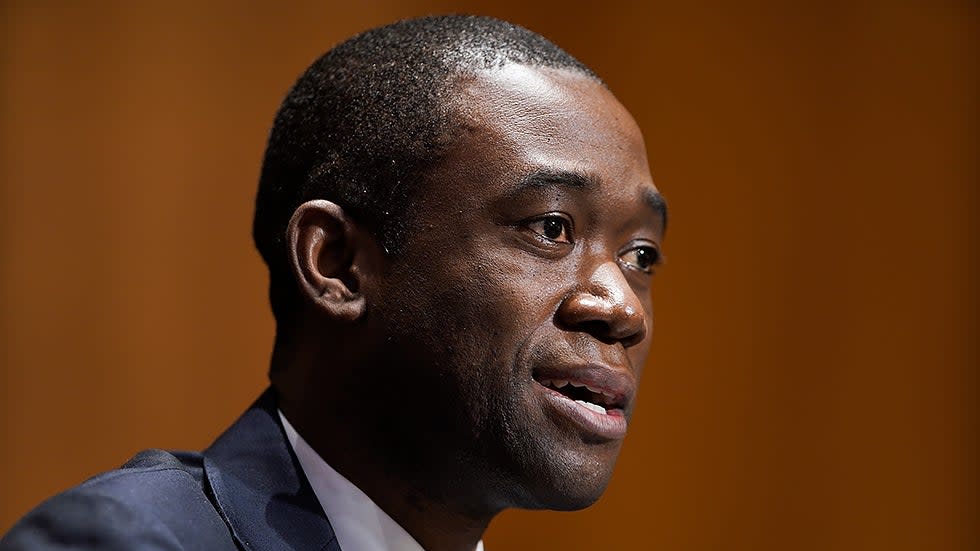Biden administration eases restrictions on aid to Afghanistan

- Oops!Something went wrong.Please try again later.
The Treasury Department on Wednesday announced it would ease restrictions on some humanitarian assistance to Afghanistan as the country faces a severe economic crisis following the Taliban takeover in August.
The department issued three new general licenses that allow the U.S. government and international and humanitarian organizations to send more assistance to Afghanistan without running afoul of sanctions on the Taliban and the Haqqani network, which are designated terrorist organizations.
The action expands the humanitarian assistance exempted from sanctions to include assistance that supports a range of activities including education, citizen participation, civil society development, noncommercial development projects benefiting the Afghan people and environmental and natural resource protection.
"The United States is the largest single provider of humanitarian assistance in Afghanistan. We are committed to supporting the people of Afghanistan, which is why Treasury is taking these additional steps to facilitate assistance," Deputy Treasury Deputy Secretary Wally Adeyemo said in a statement Thursday.
"Unfortunately, the economy faces grave challenges, exacerbated by the country's long dependence on foreign aid, donor and private sector flight sparked by the Taliban's takeover, drought, structural macroeconomic issues, and the COVID-19 pandemic," Adeyemo continued. "Treasury has provided broad authorizations that ensure NGOs, international organizations, and the U.S. government can continue to provide relief to those in need."
The move came amid sustained pressure on the Biden administration to do more to ward off an economic and humanitarian crisis in Afghanistan.
The Treasury Department also released new resources about the general licenses that have been issued since August to allow for the continued flow of humanitarian aid and trade even with sanctions on the Taliban.
During a call with reporters previewing the action, a senior Biden administration official said that the new license would allow assistance from humanitarian organizations to flow to pay teachers and potentially other civil servants without running afoul of current sanctions. The official said the administration would continue to engage in dialogue with humanitarian organizations to understand what else they need.
The action comes almost four months after the chaotic Aug. 31 withdrawal of U.S. troops from Afghanistan, which occurred as the Taliban overran the country much faster than U.S. officials anticipated.
Afghanistan is on the brink of economic collapse and in the grips of humanitarian crisis, with millions of Afghans facing life-threatening hunger.
The move by the Treasury was cautiously welcomed by Kay Guinane, founder and Senior Advisor at the Charity & Security Network.
"The new general licenses go farther than their predecessors by protecting a broader range of activities, including education, human rights, and development, that are also crucial to supporting the Afghan people," she said in a statement, but stressed that more needs to be done.
"Unfortunately, even this welcome improvement to licensing is insufficient to mount an effective response to the crisis in Afghanistan," she continued, and called for more clarity on funds to be allowed to flow towards efforts and initiatives at peacebuilding, conflict mitigation and atrocity prevention.
"Rather than taking a piecemeal approach that protects certain activities one license at a time, Treasury should issue a Global General License that encompasses all legitimate civil society operations in all locations."
William Byrd, a senior expert on Afghanistan with the U.S. Institute of Peace who served as the World Bank's country manager in Kabul, told The Hill that the general licenses are "a welcome step forward" but more actions are needed to ensure aid is delivered to the Afghan people.
In particular, it's important for the U.S. to facilitate "the smooth flow of financial transfers from foreign banks into Afghanistan and availability of adequate cash liquidity in-country for assistance payments."
Byrd added that more needs to be done to stop the "free-fall of the Afghan economy" and that will require responsible governing on the part of the Taliban. Key to supporting the economy is preserving the banking system, facilitating trade financing, supporting agriculture, and encouraging private sector business.
"Stemming the deterioration in economic confidence among the Afghan people and businesses will be an essential ingredient," he added.
Lawmakers have also pleaded with the administration to do more to address the crisis. A group of 46 House Democrats wrote to Biden earlier this week calling on the Treasury Department to unfreeze Afghanistan's central bank reserves to heed off economic and humanitarian disaster.
"As you transition into a new phase of our relationship with the country and people of Afghanistan, we stand with American allies and humanitarian experts in urging the United States to avoid harsh economic measures that will directly harm Afghan families and children," the Democrats wrote. "This means conscientiously but urgently modifying current U.S. policy regarding the freeze of Afghanistan's foreign reserves and ongoing sanctions."
Laura Kelly contributed
Updated at 4:47 p.m.

